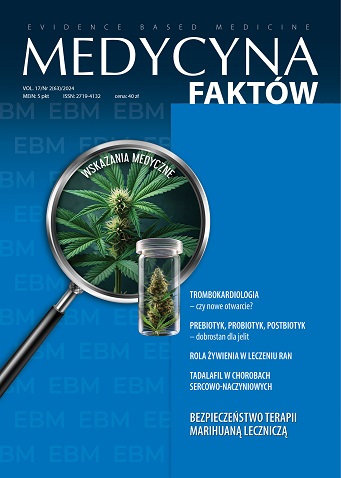Prevention and treatment of vitamin D deficiency with cholecalciferol in doses of 7,000 j.m. and 30,000 j.m. Review article
Main Article Content
Abstract
The criteria for vitamin D deficiency, i.e. 25(OH)D <20 ng/ml, and concentrations considered optimal (≥30–50 ng/ml), as well as epidemiological data, indicated the need to conduct preventive and therapeutic schedules for Poland. For obese people, for patients chronically treated with drugs affecting vitamin D metabolism (e.g. anticonvulsants, glucocorticosteroids, antiretroviral drugs, etc.), patients with malabsorption syndromes (e.g. cystic fibrosis, nonspecific intestinal inflammation, bariatric surgery, radiation enteritis), with liver failure, chronic kidney disease, osteomalacia, with chronic musculoskeletal pain, as well as with hyperparathyroidism, autoimmune diseases, for the elderly (>65 years), especially in seniors with a history of falls or low-energy fractures (osteoporosis), schemes for the prevention and treatment of vitamin D deficiency have been proposed using 7,000 j.m. and 30,000 j.m. of cholecalciferol in daily or cumulative supply, taking into account safety.
Article Details
Copyright © by Medical Education. All rights reserved.
References
2. Płudowski P, Kos-Kudła B, Walczak M et al. Guidelines for Preventing and Treating Vitamin D Deficiency: A 2023 Update in Poland. Nutrients. 2023; 15(3): 695. http://doi.org/10.3390/nu15030695.
3. Pludowski P, Takacs I, Boyanov M et al. Clinical Practice in the Prevention, Diagnosis and Treatment of Vitamin D Deficiency: A Central and Eastern European Expert Consensus Statement. Nutrients. 2022; 14(7): 1483. http://doi.org/10.3390/nu14071483.
4. Holick MF, Binkley NC, Bischoff-Ferrari HA et al. Guidelines for preventing and treating vitamin D deficiency and insufficiency revisited. J Clin Endocrinol Metab. 2012; 97(4): 1153-8. http://doi.org/10.1210/jc.2011-2601.
5. Wamberg L, Kampmann U, Stødkilde-Jørgensen H et al. Effects of vitamin D supplementation on body fat accumulation, inflammation, and metabolic risk factors in obese adults with low vitamin D levels – Results from a randomized trial. Eur J Intern Med. 2013; 24(7): 644-9. http://doi.org/10.1016/j.ejim.2013.03.005.
6. Wamberg L, Pedersen SB, Richelsen B et al. The Effect of High-Dose Vitamin D Supplementation on Calciotropic Hormones and Bone Mineral Density in Obese Subjects with Low Levels of Circulating 25-Hydroxyvitamin D: Results from a Randomized Controlled Study. Calcif. Tissue Int. 2013; 93:69-77.
7. Stallings VA, Schall JI, Hediger ML et al. High-Dose Vitamin D3 Supplementation in Children and Young Adults with HIV: A Randomized, Placebo- Controlled Trial. Pediatr Infect Dis J. 2015; 34(2): e32-40.
8. Alvarez N, Aguilar-Jimenez W, Rugeles MT. The Potential Protective Role of Vitamin D Supplementation on HIV-1 Infection. Front Immunol. 2019; 10: 2291. http://doi.org/10.3389/fimmu.2019.02291.
9. Faria ACC, Moreira CL, Cunha MRD et al. Effects of Vitamin D Supplementation on Central Hemodynamic Parameters and Autonomic Nervous System in Obese or Overweight Individuals. Arq Bras Cardiol. 2024; 121(5): e20230678. http://doi.org/10.36660/abc.20230678.
10. Khan QJ, Kimler BF, Reddy PS et al. Randomized trial of vitamin D3 to prevent worsening of musculoskeletal symptoms in women with breast cancer receiving adjuvant letrozole. The VITAL trial. Breast Cancer Res Treat. 2017; 166(2): 491-500.
11. Takacs I, Bakos B, Nemeth Z et al. Controlled randomized open label clinical study comparing the safety and efficacy of loading schedules in vitamin D deficient patients. J Steroid Biochem Mol Biol. 2023: 231: 106330. http://doi.org/10.1016/j.jsbmb.2023.106330.
12. Grant WB, Boucher BJ, Pludowski P et al. The emerging evidence for non-skeletal health benefits of vitamin D supplementation in adults. Nat Rev Endocrinol. 2022; 18(5): 323. http://doi.org/10.1038/s41574-022-00646-x.
13. Grant WB, Al Anouti F, Boucher BJ et al. A Narrative Review of the Evidence for Variations in Serum 25-Hydroxyvitamin D Concentration Thresholds for Optimal Health. Nutrients. 2022; 14(3): 639. http://doi.org/10.3390/nu14030639.
14. Marcinowska-Suchowierska E, Kupisz-Urbańska M et al. Vitamin D Toxicity-A Clinical Perspective. Front Endocrinol (Lausanne). 2018; 9: 550. http://doi.org/10.3389/fendo.2018.00550.

